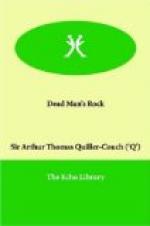TELLS AN OLD STORY IN THE TRADITIONAL MANNER.
When Tom asked me where I was going, I had suggested an excursion up the river; though, to tell the truth, this answer had come with the question. Be that as it may, the afternoon of that same Sunday found me on the left bank of the Thames between Streatley and Pangbourne; found me, with my boat moored idly by, stretched on my back amid the undergrowth, and easefully staring upward through a trellis-work of branches into the heavens. I had been lying there a full hour wondering vaguely of my last night’s adventure, listening to the spring-time chorus of the birds, lazily and listlessly watching a bough that bent and waved its fan of foliage across my face, or the twinkle of the tireless kingfisher flashing down-stream in loops of light, when a blackbird lit on a branch hard by my left hand, and, all unconscious of an audience, began to pour forth his rapture to the day.
Lying there I could spy his black body and yellow bill, and drink in his song with dreamy content. So sweetly and delicately was he fluting, that by degrees slumber crept gently and unperceived upon my tired brain; and as the health-giving distillation of the melody stole upon my parched senses, I fell into a deep sleep.
What was that? Music? Yes, but not the song of my friend the black-bird, not the mellow note that had wooed me to slumber and haunted my dreams. Music? Yes, but the voice was human, and the song articulate. I started, and rose upon my elbow to listen. The voice was human beyond a doubt—sweetly human: it was that of a girl singing. But where? I looked around and saw nobody. Yet the singer could not be far off, for the words, though softly and gently sung, dwelt clearly and distinctly upon my ear. Still half asleep, I sank back again and listened.
“Flower of the May,
Saw ye one
pass?
’Love passed to-day
While the
dawn was,
O, but the
eyes of him shone as a glass.’”
The low, delicate notes came tremulous through the thicket. The blackbird was hushed, the trees overhead swayed soundlessly, and when the voice fell and paused, so deep was the silence that involuntarily I held my breath and waited. Presently it broke out again—
“Bird of the thorn,
What his
attire?
’Lo! it was torn,
Marred with
the mire,
And but
the eyes of him sparkled with fire.’”
Again the voice died away in soft cadences, and again all was silence. I rose once more upon my elbow, and gazed into the green depths of the wood; but saw only the blackbird perched upon a twig and listening with head askew.
“Flower of the May,
Bird of
the—”
The voice quivered, trailed off and stopped. I heard a rustling of leaves to the right, and then the same voice broke out in prose, in very agitated and piteous prose—“Oh, my boat! my boat! What shall I do?”




